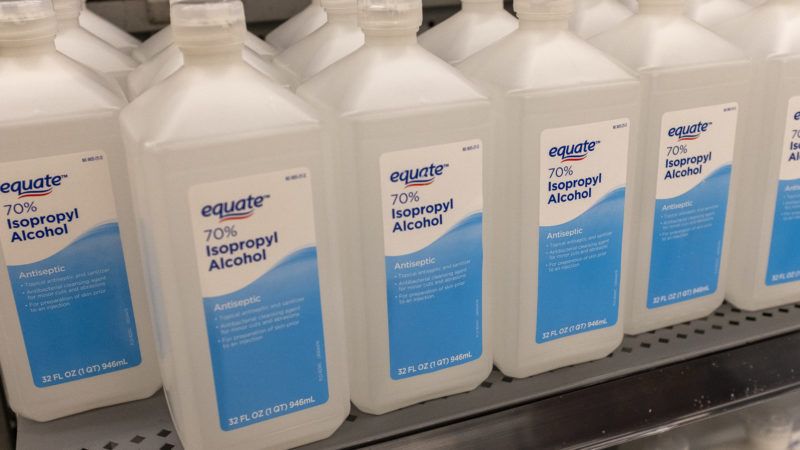The Trump Administration Is Still Charging 25 Percent Tariffs on Disinfectants Used To Combat COVID-19
"The tariff is making it more difficult for companies to supply our nation's essential workers with antiseptics and sanitizing products they need."

President Donald Trump's tariffs are crimping supply chains for chemicals used to manufacture disinfectants and cleaning products—items that are needed to combat COVID-19 and that will be in even higher demand as the economy reopens.
In a letter sent last week to U.S. Trade Representative Robert Lighthizer, the American Chemistry Council, an industry group, highlighted dozens of items that are subject to the Trump administration's tariffs. The list sent to Lighthizer includes various chemical building blocks used to manufacture everything from soap to detergent, and surface cleaners to bleach.
One of the most important is isopropyl alcohol, a critical ingredient in hand sanitizer and other disinfectants used by households, the food service industry, and first responders. Since 2018, imports of isopropyl alcohol from China have been subject to 25 percent tariffs.
"The tariff is making it more difficult for companies to supply our nation's essential workers with antiseptics and sanitizing products they need to protect themselves and others from COVID-19," Chris Jahn, president and CEO of the American Chemistry Council, tells Reason.
The Trump administration took action in March to exempt medical equipment—including face masks and personal protective equipment (PPE)—from its tariff regime. But those exclusions did not apply to chemicals, like isopropyl alcohol and the dozens of other items on the council's list that are not strictly defined as medical equipment but remain crucial to many products used by health care workers.
Trump's tariffs are also affecting companies that need to purchase disinfectant wipes and other cleaning products. "According to the CDC guidelines…to prevent the spread of COVID-19 it recommends the use of EPA approved disinfectant wipes," wrote Daniel Marquardt, principal owner of Hilo Industries LLC, a Virginia-based construction contractor, in a tariff exemption request filed last month. Hilo, like many other businesses across the country, needs to import tubs of disinfectant wipes that will be "used by our customers, employees, and their customers to enable them to work and patronize safely to help combat and control COVID-19," Marquardt wrote.
But the tariff exemption process is opaque and slow—far from the ideal way to relieve the stress tariffs are causing. Sens. Tom Carper (D–Del.) and Pat Toomey (R–Pa.) have urged the Trump administration to move more quickly and issue more tariff exemptions in order to speed the response to the pandemic, but White House trade adviser Peter Navarro has laughed off those concerns as "fake news."
In the long term, maintaining tariffs that make it more difficult and expensive to manufacture disinfectants seems even more foolish. As the economy reopens, there will likely be a surge in demand for cleaning products capable of killing the virus that causes COVID-19 in order to keep the customers of restaurants, offices, and salons safe from infection. There are American companies churning out those products, but Trump's tariffs are getting in the way.
Trump and his supporters often seek to frame the trade war as a way to break America's supposed dependence on Chinese goods. But if these tariffs were intended to drive producers out of China, well, they weren't really necessary in the first place. In 2017, the last year before Trump's trade war began, the U.S. imported about $1.8 million of isopropyl alcohol from China. But the United States imported more than $121 million from all sources around the globe, according to data from the Department of Commerce.
The tariffs have also been ineffective at their stated goal. In 2019, U.S. companies imported $1.9 million of isopropyl alcohol from China and paid more than $400,000 to the federal government in taxes for the privilege of doing so—up from about $100,000 in import duties in 2017.
"The tariffs on China aren't really thwarting these imports," says Dan Ikenson, director of trade policy studies at the Cato Institute.
But the tariffs are making it more expensive for American businesses to make those purchases, and therefore leaving them unable to purchase as much as they might otherwise choose. Much of the Trump administration's trade war has been a real-life lesson in what economists call a "deadweight loss"—that is, a market inefficiency that creates losses for some participants but no gains for anyone else—but rarely does it appear this obvious.
"Trump really needs to drop tariffs on all imports during this pandemic," says Ikenson. "That would free up cash flow—north of $6 billion per month—for companies to continue to operate, keep supplies moving, and keep workers on payrolls."
The Trump administration has delayed tariff payments for three months as a way to boost liquidy for American importers, but that's little help over the long term. Tariffs on products that are necessary components of disinfectants will only make it more difficult to achieve the reopening that Trump desperately seeks.
"If there were ever a time to put differences aside and provide tariff relief to support U.S. national security, economic stability, and the health and livelihoods of all Americans," says Jahn, "that time is now."


Show Comments (129)